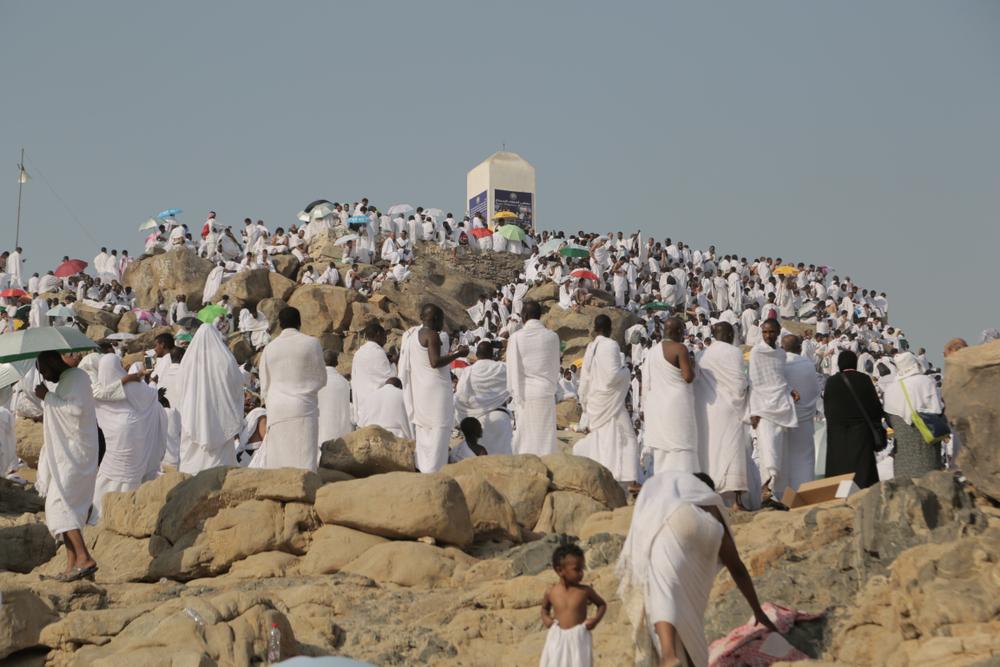
On the 9th of Dhul Hijjah, one of the most blessed days of the Islamic Calendar is set to fall – the Day of Arafah. This auspicious day takes place in the holy month of Dhul Hijjah, and it’s greatly significant in regard to the Qurbani rituals that occur at this time of year. Discover more with UKIM below.
The Day of Arafah is a commemoration of the ultimate sacrifice that the Prophet Ibrahim (AS) was willing to make. Allah (SWT) instructed the Prophet Ibrahim (AS) to sacrifice his son, Ismail (AS), out of his devotion to the Creator. Both the Prophet Ibrahim (AS) and Ismail (AS) obliged and journeyed to the top of Mount Arafat to carry out the deed. At the moment of the sacrifice, Allah (SWT) intervened, performing a miracle and putting a ram in place of Ismail (AS), leaving him completely unharmed. This was to reward the pair for their undying dedication to Allah (SWT).
Ultimately, this day is of the utmost significance as it is the day on which the Prophet Ibrahim (AS) was prepared to give up the most precious thing in his life in the name of the Creator. It was on this day that Allah (SWT) discovered that there was truly nothing that the Prophet Ibrahim (AS) wouldn’t do for him, and all Muslims should strive to lead their lives in this way.
The Day of Arafah falls on the 9th of Dhul Hijjah, which is the 12th and final month of the Islamic Calendar. Dhul Hijjah is one of the four sacred months in the Islamic Calendar, and the Day of Arafah is a sacred day, making the occasion truly special. This year, the Day of Arafah is due to fall on Saturday, 15 June. Of course, this date is subject to change, as the Islamic Year follows the lunar calendar.
Since the Day of Arafah is one of the holiest days in the Islamic Calendar, there are many things that you can do to reap the rewards of this blessed day. Above all else, you should strive to devote yourself to Allah (SWT) and increase your good deeds. Some examples of ways to do this are explored in further detail below:
Although it’s not compulsory for Muslims to be fasting on Arafah, it’s very much recommended that they do so if they’re not going on Hajj. This is because fasting enables Muslims to expiate sins of the past and the coming year.
The Day of Arafah is a time when Muslims should recite more dua. For instance, the Prophet Muhammad (PBUH) said the following:
"The most excellent dua is the dua on the Day of Arafah, and the best of what I and the prophets before me have said is "There is nothing that deserves to be worshipped in truth except Allah; he is Alone and has no partner, to Him belongs the dominion and to Him belongs all praise, and He is All-Powerful over all things.'" (Muwatta)
لا إله إلا الله وحده لا شريك له ، له الملك ، وله الحمد ، وهو على كل شيء قدير
In addition to additional dua, Muslims should also take the Day of Arafah as an opportunity to recite Tahleel, Takbeer, Tahmeed, and Tasbeeh:
The Day of Arafah is also the perfect opportunity to seek forgiveness from Allah (SWT). Since blessings are multiplied on this day, this is the ideal time to carry out good deeds and repent for your past sins. By gaining forgiveness from Allah (SWT), you’ll find that your life on earth is more blessed, and you’ll increase your chances of being accepted into Jannah.
One of the best deeds you can do on the Day of Arafah is to share your wealth with the less fortunate. Donating to UKIM on the Day of Arafah allows you to reach your brothers and sisters in need while also reaping your own blessings on this holy day. Whether you give Sadaqah, Zakat, or Qurbani, your donation has the power to transform lives globally. So, fulfil your obligation to Allah (SWT) on this special day and make your donation with us.
Copyright © 2025 UKIM All Rights Reserved.
UK Registered Charity Since 1962
Charity Registration No. 250275


